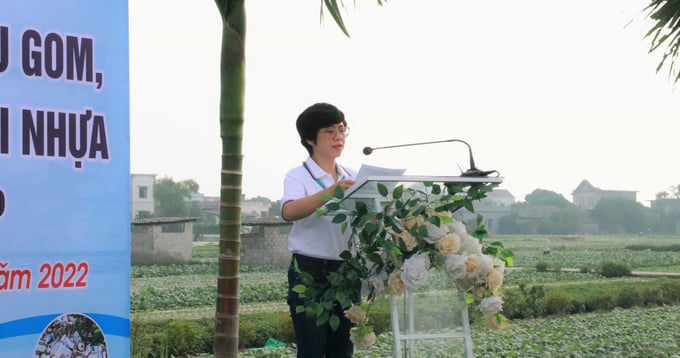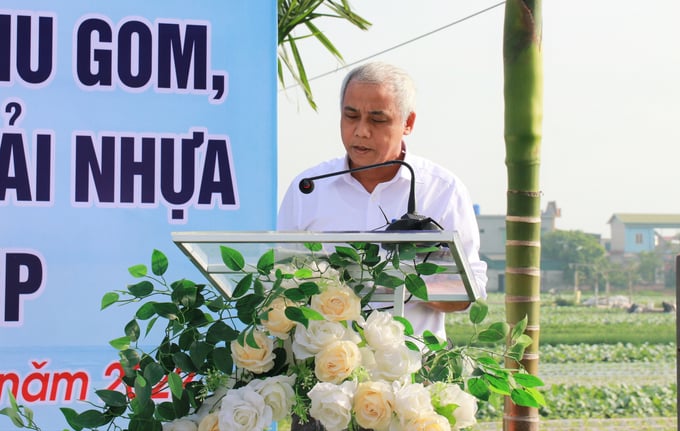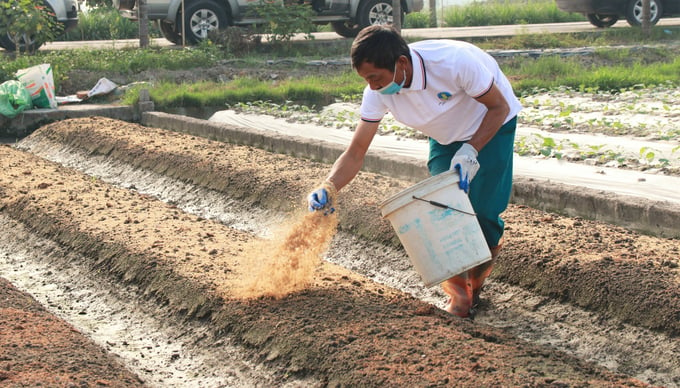June 21, 2025 | 03:09 GMT +7
June 21, 2025 | 03:09 GMT +7
Hotline: 0913.378.918
June 21, 2025 | 03:09 GMT +7
Hotline: 0913.378.918
In order to minimize, prevent and avoid the harmful effects of plastic waste generated from agroproduction, on November 23 in Thai Binh, the Department of Science, Technology and Environment (Ministry of Agriculture and Rural Development), in collaboration with Thai Binh Department of Agriculture and Rural Development, held a meeting with the theme "Propaganda on reducing, collecting, sorting and reusing plastic waste in agriculture".

Ms. Nguyen Giang Thu, Deputy Director of Department of Science, Technology and Environment (Ministry of Agriculture and Rural Development) delivered the opening speech. Photo: Hoang Giang.
Agroproduction in recent years has achieved great results, expanding production scale, applying high technology, organic and environment-friendly models, ensuring biosecurity and disease safety, using resources with great efficiency, adapting to climate change, meeting high requirements on food quality and safety for domestic consumption and export.
However, according to Ms. Nguyen Giang Thu, Deputy Director of the Department of Science, Technology and Environment, agroproduction has also left behind certain effects on the environment, creating a large amount of plastic waste in particular. Information from the 2020 National Environment Status Report showed that an estimated 438,000 kg of packages and bottles of pesticides had been collected with a destruction rate of 79%.
The movement "Say no to plastic waste" has been deployed in many localities over the past period and achieved positive results. Among the localities, Thai Binh stands out as a pioneer province and has achieved many great feats. Some models such as "Clean field - collection of pesticide packaging", “Separation and treatment of household waste”, and “Limit the use of plastic bags” has attracted the participation of local people and brought many practical benefits. And Quynh Phu district is a typical locality participating in those movements.

Mr. Do Cong Chuan, Chairman of Quynh Hai Commune People's Committee, said that over the years, environmental protection work in Quynh Hai commune (Quynh Phu district, Thai Binh province) has always received close attention and focus from people in the commune. Photo: Hoang Giang.
“The People's Committee of Quynh Hai commune has been implementing and coming up with activities to preserve hygiene and protect the environment at every home, school, residential community, production area. The movements of ‘green, clean and beautiful’, planting trees, building flower routes are held regularly. Many activities have received a wide response from the people. The whole community actively joins with authorities at all levels to implement environmental sanitation, contributing to environmental protection in the province," said Mr. Do Cong Chuan, Chairman of Quynh Hai Commune People's Committee.
At the event, Mr. Do Cong Chuan called for the attention and active participation of mass organizations, authorities at all levels, socio-political organizations and the people to continue implementing measures to protect the environment. Some of the focus include:
- Monitoring the use of single-use plastic products, plastic bags for the environment and human health; building, improving efficiency and replicating self-management models themed on environmental protection, collection, classification and treatment of plastic waste in the field.
- Periodically and regularly organize campaigns in response to the environmental sanitation movement in fields and canals. Each citizen continues to change the habit of using non-biodegradable plastic bags and disposable plastic products in daily activities and agroproduction, using eco-friendly products.
- Party committees at all levels continue to pay attention to and direct the implementation of the movements. Each party member should raise responsibility and set an example in their residence.

The representative of the Ministry of Agriculture and Rural Development presented the plastic waste collection trash bins to the locality. Photo: Hoang Giang.
Mentioning some solutions to reduce plastic waste, raise people's awareness to limit the use of inputs made from plastic, Mr. Do Cong Chuan said, “We have propagated, promoted training, put IPM and organic fertilizing production programs in practice, increase product value and income for farmers. Regarding the use of fertilizers and pesticides, we now use microbiological materials, which are toxin-reducing drugs to shorten the soil isolation time, thereby ensuring product safety standards."
In the process of applying technologies, people used products such as nylon to cover the soil before planting. So in order to reduce the use of plastic, the People's Committee of Quynh Hai commune has directed the people to use nylon coverage with good durability, capable of being used in production for 2-3 years before needing to be replaced. Every time they change, people will collect and process them.

Farmers in Quynh Hai commune actively apply alternative methods to reduce the use of plastic products in agroproduction. Photo: Hoang Giang.
"We have collected and contracted with a waste treatment company which comes every three months. We build storage tanks and assign teams to collect trash monthly, and then transport them to the commune’s concentrated landfill. When the company comes back, the trash will be transported and handed over to the company," said Mr. Do Cong Chuan.
Translated by Samuel Pham
![Turning wind and rain into action: [9] Digitizing hydrometeorological data in response to climate change](https://t.ex-cdn.com/nongnghiepmoitruong.vn/608w/files/news/2025/06/17/z6704423696987_15fd32ffc26d590d204d520c9dac6786-nongnghiep-165943.jpg)
(VAN) Farmers have begun accessing hydrometeorological applications to adjust their cropping schedules, aiming to ensure productivity and adapt to climate change.
![Turning wind and rain into action: [8] Real-time salinity detection and early warning technology](https://t.ex-cdn.com/nongnghiepmoitruong.vn/608w/files/news/2025/06/17/z6704423696987_15fd32ffc26d590d204d520c9dac6786-nongnghiep-151127.jpg)
(VAN) Thanks to the integration of modern hydrological-hydraulic models, remote sensing technologies, and artificial intelligence, the accuracy of hydrological forecasting has significantly improved.
![Turning wind and rain into action: [7] Early disaster warnings help marine farmers minimize losses](https://t.ex-cdn.com/nongnghiepmoitruong.vn/608w/files/news/2025/06/17/z6704423696987_15fd32ffc26d590d204d520c9dac6786-nongnghiep-142942.jpg)
(VAN) In recent years, thanks to early disaster warnings and forecasting, marine farmers in Khanh Hoa province have been able to reduce risks and losses, thereby improving production efficiency.
![Turning wind and rain into action: [6] ‘Four on-the-spot’ disaster management software](https://t.ex-cdn.com/nongnghiepmoitruong.vn/608w/files/news/2025/06/17/e5a48259d6a262fc3bb3-nongnghiep-183800.jpg)
(VAN) By simply activating the scenario on the disaster management software, the relevant authorities immediately know how many households need to be evacuated, where to evacuate them to, and by what means of transportation…
![Turning wind and rain into action: [5] Hue applies modern technology in disaster forecasting](https://t.ex-cdn.com/nongnghiepmoitruong.vn/608w/files/news/2025/06/17/z6704423696987_15fd32ffc26d590d204d520c9dac6786-nongnghiep-093938.jpg)
(VAN) In Hue city, modern technology has recently been applied in meteorological and hydrological forecasting and warning, helping to reduce the damage caused by natural disasters.

(VAN) A cutting-edge farming technique being implemented on an experimental ranch in Arizona's Sonoran Desert has already saved a billion gallons of water over five years, according to Civil Eats.

(VAN) Poultry and pig production and the environment can be boosted through enhanced water technology, according to new research.